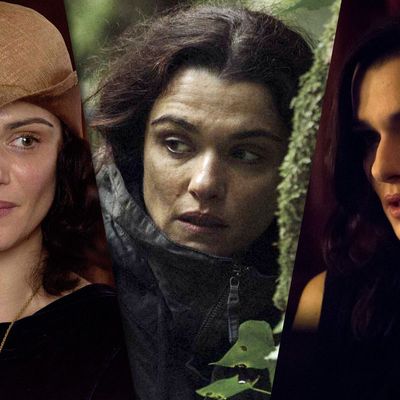
Imagine, for a second, that you’re a famous actor: award-winning, at the top of your game, and free to choose any role you please. Sitting on your veranda, contemplating a martini and the sunset, you get a call from your agent concerning a potential role. Here are the details:
1. You would play the mother of a missing baby girl who, unbeknownst to you, washes ashore on a remote island, where a lighthouse keeper and his wife, desperate for a child following two miscarriages, take the infant and raise it as their own.
2. You wouldn’t enter the movie until about halfway through, by which point the audience would have already bonded with the lighthouse keeper and his wife, who are doting parents and also, by the way, will both be played by beautiful, charismatic movie stars who, by the way, are dating in real life, adorably.
3. You would have to cry a lot — like, a lot.
4. You would have to wear this hat.
Would you take this challenging, unfairly antagonistic role, which would pay you the dividends of a supporting part for the effort of a lead? Because Rachel Weisz did for The Light Between Oceans, and she knocked it out of the damn park.
As an actor, Weisz is a known quantity. She won an Academy Award in 2005 for The Constant Gardener, and has played some 50 parts over more than 20 years. But despite this formidable résumé, she’s put together a year that’s impressive even for her. In May, she appeared as “Short Sighted Woman,” in The Lobster, Yorgos Lanthimos’s lovelorn send-up of dating and mating, appearing halfway through the film to provide Colin Farrell’s character a strange romantic interest. And this past weekend she played both the deceptive, unfolding woman at the heart of Joshua Marston’s meditation on identity, Complete Unknown, as well as the herculean task described above, in Derek Cianfrance’s The Light Between Oceans.
It isn’t just that Weisz is doing good work. With all three of these movies, she comes swooping in partway through, tasked with upending an already established narrative. In The Lobster, she must create, against all odds, the possibility of a happy ending; in Complete Unknown, she has to sell the premise that her character would willingly reinvent her life on a regular basis; in The Light Between Oceans, her role is the very definition of “thankless,” as David Edelstein put it. Not only must she make an impression alongside other impressive actors — a list that, across these three films alone, includes Colin Farrell, John C. Reilly, Léa Seydoux, Michael Shannon, Michael Fassbender, and Alicia Vikander — but she must do so with less screen time and less backstory or exposition.
For those reasons, her performance in The Light Between Oceans is particularly striking. For an hour, the audience has watched the characters played by Fassbender and Vikander bond with the sweet baby girl they found washed up on the beach in a rowboat next to her dead father. In case you’re wondering if that idyllic couple and a picturesque child are as beautiful and happy as they might seem, yes, they are, and then some — they’re like a family in an L.L. Bean catalogue, except better-looking. When Weisz first appears, despite the sympathetic nature of her character’s situation (that’s her kid they’re raising), she poses the ultimate threat to the happy family we’ve come to love. Cianfrance isn’t looking for a villain, but insofar as anyone inhabits that paradigm here, it’s her.
Weisz has a remarkable face, with boomerang cheekbones that give her a sort of default intensity; combined with the expressiveness of her eyes, she’s able to communicate the full spectrum of emotion without even requiring a close-up. It’s a skill that she puts to great use in Complete Unknown, in which the camera is often studying her from across a room or from the perspective of another character; she has to betray herself while still being inscrutable. That subtlety also makes her the perfect actor for The Lobster director Lanthimos, who tends to require a beguiling straight-face from his performances, a comic dryness somewhere between Brut champagne and the Mojave desert. Actors who must be showy can’t survive in that kind of environment, but because Weisz communicates so effortlessly through a camera lens, she ends up demonstrating a deceptive depth in the film, one that just gets deeper the further down you go. Most of all, she’s very funny.
For The Light Between Oceans, however, she’s allowed to go full tilt: in Cianfrance’s world, crying is as natural a state as sitting still. While that becomes a balancing act that his movie can’t maintain, eventually teetering from gorgeous melodrama into overripe sentimentality, it does provide a rich environment for Weisz to work in. Her first encounter with Fassbender and Vikander is the film’s defining moment, the rupture that undoes everything that came before, and it works thanks to Weisz’s shellshock; she’s so obviously ruined that the happy couple can’t help but unravel, fully possessed by the knowledge of what they did to her. Vikander goes sprinting into the bathroom, Fassbender toward his possible undoing, and you think: Well, of course. If I’d seen that face, I would’ve done the same thing.
An actor of great natural gifts, Weisz has a versatility many of her peers do not, and that potency and command is why she can play such an array of characters — a satiricial love-seeker, a mysterious ingénue, and a despairing mother — and consistently have a major impact even in a minor role. It’s one thing to be handed a leading role by a director or a script and then give a great performance; it’s another to appear in a supporting part and then rip that movie away for yourself. Weisz prefers the latter.

